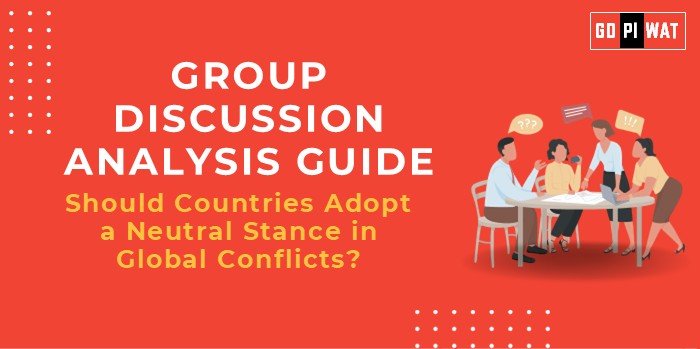📋 Group Discussion (GD) Analysis Guide
🌐 Should Countries Adopt a Neutral Stance in Global Conflicts?
📖 Introduction to the Topic
Opening Context: “In an era of shifting geopolitical alliances and increasing polarization, the question of whether nations should maintain neutrality in global conflicts remains critical, especially in a world interconnected by trade, technology, and climate challenges.”
Topic Background: Neutrality has historical roots, with countries like Switzerland adopting this stance during World War II. In today’s multipolar world, neutrality is seen as a diplomatic tool to navigate complex international relations, but it also sparks debates on moral responsibility and strategic interests.
📊 Quick Facts and Key Statistics
- 🌍 UN Membership: 193 countries, only a few declare neutrality (e.g., Switzerland, Austria).
- 💼 Economic Interdependence: Global trade interdependence reached $28 trillion in 2023 (UNCTAD).
- ⚔️ Global Conflicts: Over 110 armed conflicts active globally in 2023 (Uppsala Conflict Data Program).
- 📜 Neutrality in Treaties: The Hague Conventions of 1907 formalized the rights and duties of neutral powers.
🌟 Stakeholders and Their Roles
- 🏳️ Neutral Countries: Advocate peace and provide mediation platforms (e.g., Switzerland hosting UN offices).
- 🌍 Conflict Parties: Countries directly involved often view neutrality as tacit approval or complicity.
- 🏛️ International Organizations: The UN and NATO sometimes challenge neutrality to ensure collective security.
- 👥 Global Citizens: Public opinion often influences governments’ stances on neutrality versus intervention.
🏆 Achievements and Challenges
✨ Achievements
- ✅ Domestic Stability: Neutrality ensures stability and avoids economic sanctions.
- 🤝 Peace Mediation: Nations like Sweden and Switzerland have mediated peace negotiations successfully.
- 📉 Reduced Military Spending: Switzerland spends only 0.7% of its GDP on defense.
⚠️ Challenges
- ⚖️ Perceived Moral Apathy: Critics argue neutrality avoids responsibility (e.g., Rwandan genocide).
- 📉 Economic Vulnerabilities: Non-aligned stances in sanction wars can hurt trade (e.g., Ukraine crisis).
- 🤔 Defense Limitations: Neutral countries often face restrictions on defense cooperation with allies.
📘 Global Comparisons:
– Success: Switzerland’s neutrality enabled it to thrive as a financial hub.
– Challenge: Finland abandoned neutrality post-Russian aggression, joining NATO in 2023.
💬 Structured Arguments for Discussion
- ✅ Supporting Stance: “Neutrality preserves sovereignty, reduces risks, and allows nations to mediate effectively.”
- ❌ Opposing Stance: “Neutrality often equates to moral irresponsibility, enabling aggressors unchecked.”
- ⚖️ Balanced Perspective: “Neutrality is context-dependent; it can be a strategic asset or a moral liability based on global dynamics.”
💡 Effective Discussion Approaches
- 🌏 Opening Approaches:
- “Historically, neutrality has shielded countries from direct conflict, but does it hold up in today’s interconnected world?”
- “With global conflicts threatening economic stability, should nations prioritize interests over moral commitments?”
- 🤔 Counter-Argument Handling:
- Challenge: “Neutrality is morally irresponsible.”
Response: “Highlight pragmatic successes such as Switzerland’s stability and peace mediation.” - Challenge: “Neutrality limits defense cooperation.”
Response: “Discuss the potential for partnerships in non-military areas like humanitarian aid.”
- Challenge: “Neutrality is morally irresponsible.”
🔍 Strategic Analysis of Strengths and Weaknesses
- 💪 Strengths: Diplomatic flexibility, reduced military expenditure.
- ⚖️ Weaknesses: Perceived apathy, economic sanctions.
- 📈 Opportunities: Peace negotiations, trade opportunities.
- ⚠️ Threats: Global expectations, proxy conflicts spilling over.
🎓 Connecting with B-School Applications
- 🌍 Real-World Applications: Projects on global governance, neutrality in corporate ethics, and trade impact.
- 💬 Sample Interview Questions:
- “How can neutrality impact a country’s global trade partnerships?”
- “Compare Switzerland’s and Finland’s approaches to neutrality.”
- 💡 Insights for Students:
- Neutrality’s lessons in stakeholder management.
- Balancing corporate neutrality with social responsibility in global markets.


